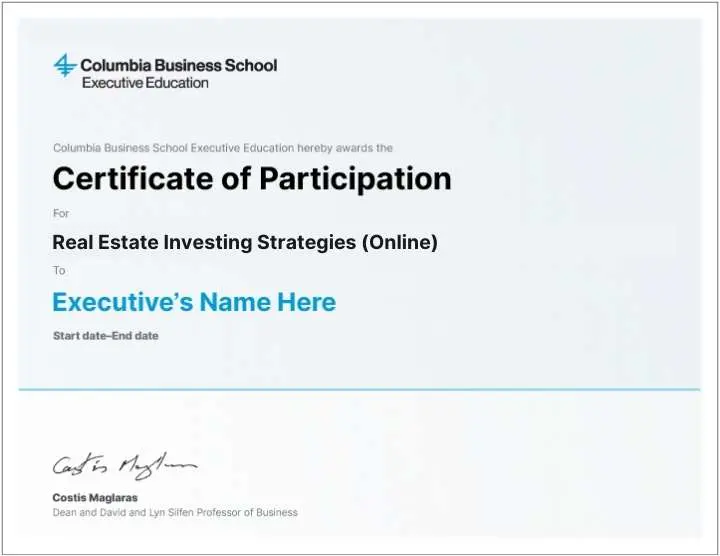Real Estate Investing Strategies (Online)
Early Registration Benefit
Apply now to secure your place at Invalid liquid data byInvalid liquid data.
Connect with a learning advisor for more information.
Key Takeaways
After participating in this program, you will be able to:
Calculate real estate valuation based on capitalization rate and cash flow as well as conduct pro forma analyses
Examine how mortgage financing affects the risk and return on investment (ROI) of real estate investments
Create new opportunities to recapitalize and reposition troubled properties and organizations by applying value investing strategies to the real estate industry
Evaluate the risks and rewards associated with land, development, and affordable housing investments
Analyze residential property data to support more informed investment decisions
Who Should Attend?
Real estate investors looking to offer better ROI to their clients, increase awareness of global investment opportunities, and strengthen brand reputation
Mid- to senior-level fund managers and investors interested in including real estate as part of an overall investment portfolio and understanding frameworks for making profitable real estate investments
CXOs and business professionals seeking to develop expertise in large-scale real estate investments and expand infrastructure to support business growth
Real estate professionals looking to gain insights into future trends and developments in real estate financing
Program Modules
In each module, leading faculty from Columbia Business School’s Paul Milstein Center for Real Estate will focus on the latest strategies for applying value investing to the real estate industry, determining valuation based on capitalization rate and cash flow, and analyzing property data to support more informed investment decisions.
Note: Participants are required to have access to Microsoft Excel for the duration of the program to successfully complete all assignments.
Program Experience

Learn from accomplished faculty, and industry experts whose diverse backgrounds encompass a broad range of disciplines

Accomplished academics and experts offer unique perspectives and the opportunity to put learning into practice

Stimulating discussions with like-minded global peers expand your professional network and build a supportive community

Through exploratory sessions, examine practical examples and find innovative solutions to strategic challenges

Get actionable insights in live online interactions with faculty who are recognized leaders in their fields

Hone business acumen and executive skills with try-it activities that help you redefine your potential

Engage in a multifaceted experience where you apply program learnings to a real-world case
Program Faculty

Edward S. Gordon Professor of Real Estate in Finance, Columbia Business School

Paul Milstein Professor of Real Estate in Finance, Columbia Business School

Earle W. Kazis and Benjamin Schore Professor of Real Estateand Professor of Finance, Columbia Business School

Certificate
Upon completion of the Real Estate Investing Strategies (Online) program, you will receive a certificate of participation from Columbia Business School Executive Education. This certificate also awards two credits towards the Certificate in Business Excellence, which grants select alumni and tuition benefits. Learn More
Your digitally verified certificate will be issued in your legal name and emailed to you, at no additional cost, upon completion of the program, including all modules of the program (online, in person, or live online, inter-module). All certificate images are for illustrative purposes only and may be subject to change at the discretion of Columbia Business School Executive Education.
FAQs
Didn't find what you were looking for? Write to us at learner.success@emeritus.org or Schedule a call with one of our Program Advisors or call us at +1 315 387 4431 (US) / +44 203 838 0836 (UK) / +65 3138 4449 (SG)
Early registrations are encouraged. Seats fill up quickly!
Flexible payment options available.
Starts On






